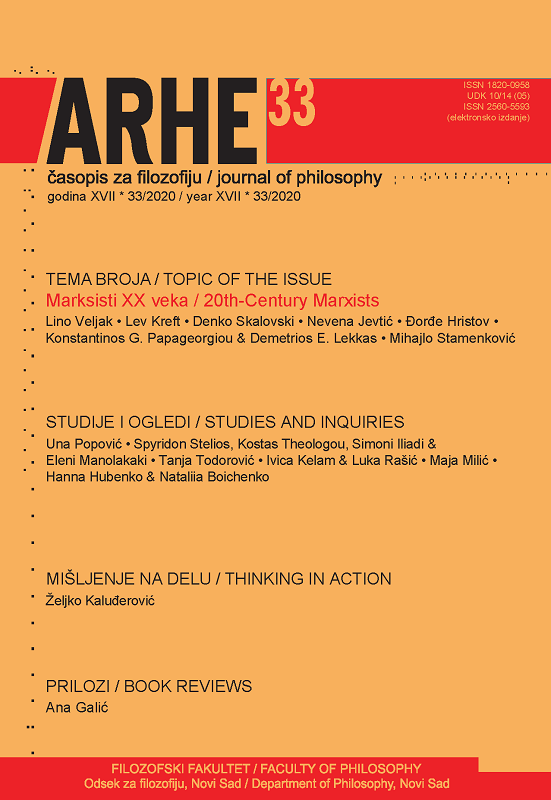KA MODELU DOPRINOSEĆIH STRUČNJAKA-GENERALISTA
Glavni sadržaj članka
Apstrakt
Proučavanje stručnosti fokusiralo se na pojam specijalizacije i specijalista – kako iz sociološke, tako i iz biološke perspektive. Uzimalo se zdravo za gotovo da se stručnost tiče samo specijalizacije; čak i pojedinci koji su karakterisani kao „polimati” ili homo universalis-i smatrani su stručnjacima-specijalistima u mnogim oblastima. Mogu li danas postojati stručnjaci koji bi bili specijalisti u brojnim oblastima? To je pitanje varljivo ili nevažno jer ne može prihvatiti pojam pojedinaca koji nisu ni specijalisti, niti „polispecijalisti”, već raspolažu znanjem drugačijeg stupnja: ne analitičkim, nego radije sintetičkim i apstraktnim, koje proizlazi iz opšteg sagledavanja, a ne iz posebnog iskustva. Ovde se predlaže novi tip stručnjaka: doprinoseći stručnjaci-generalisti. Njihova nužnost potiče od metodologije prave epistēmē. Biće identifikovane njihove karakteristike i o tim karakteristikama će se raspravljati, biće dati pojedini empirijski primeri, a o njihovom ekspertskom statusu raspravljaće se korišćenjem različitih teorijskih pristupa stručnosti, naime nauke o izuzetnim postignućima (SEA), studije stručnosti i iskustva (SEE), kao i naučne tehnologije i društva (STS).
Detalji članka
Reference
———. 1990. “On Theoretical Work: Difficulties and Resources.” In Philosophy and the Spontaneous Philosophy of the Scientists & Other Essays, edited by G. Elliot, 43–68. London and New York: Verso.
Collins, H., and R Evans. 2007. Rethinking Expertise. The University of Chicago Press.
Collins, H. M., and Robert Evans. 2002. “The Third Wave of Science Studies: Studies of Expertise and Experience.” Social Studies of Science 32/2(April 2 (2): 235–96.
Epstein, David. 2019. Range : How Generalists Triumph in a Specialized World. Penguin.
Ericsson, K. Anders, R. T. Krampe, and C. Tesch-Römer. 1993. “The Role of Deliberate Practice in the Acquisition of Expert Performance.” Psychological Review 100 (3): 363–406. http://doi.apa.org/psycinfo/ 1993-40718-001.
Feltovich, Paul J., Michael J. Pretula, and K. Anders Ericsson. 2006. “Studies of Expertise from Psychological Perspectives.” In The Cambridge Handbook of Expertise and Expert Performance, edited by K. A. Ericsson, Neil Charness, Paul J. Feltovich, and Robert R. Hoffman, 41–68. Cambridge University Press.
Feyerabend, Paul. 1993. Against Method. Verso.
Goto, Kunio. 2013. “STS and Marxist Study: Where Are We Standing Now?” Social Epistemology 27 (2): 125–29. https://doi.org/10.1080/ 02691728.2013.793755.
Hill, M. Nicole, and Walter Schneider. 2006. “Brain Changes in the Development of Expertise: Neuroanatomical and Neurophysiological Evidence about Skill-Based Adaptations.” In The Cambridge Handbook of Expertise and Expert Performance, edited by K. A. Ericsson, Neil Charness, Paul J. Feltovich, and Robert R. Hoffman, 653–82. Cambridge University Press.
Ioannidis, John P. A. 2005. “Why Most Published Research Findings Are False.” PLoS Medicine 2 (8): e124. https://doi.org/10.1371/journal.pmed. 0020124.
———. 2012. “Why Science Is Not Necessarily Self-Correcting.” Perspectives on Psychological Science 7 (6): 645–54. https://doi.org/10.1177/ 1745691612464056.
Latour, Bruno, and Steve Woolgar. 1986. Laboratory Life: The Construction of Scientific Facts. Princeton University Press. https://books.google.com/ books?id=vJ-JueUwptEC&pgis=1.
Marx, Karl. 1844. “Economic & Philosophic Manuscripts of 1844.” marxists.org. https://www.marxists.org/archive/marx/works/download/pdf/Economic-Philosophic-Manuscripts-1844.pdf.
Papageorgiou, Konstantinos G. 2016. “An Anthropologist, Wild Scientists, Flying Donkeys and Other Animals (GR.).” Aetion, no. 4: 131–33.
Papageorgiou, Konstantinos G., and Demetrios Lekkas. 2014. “Epistēmē and (vs) Scientia.” In Philosophy, Natural Sciences, Bioethics, 1–15. Athens. http://deeaef.gr/wp-content/uploads/2016/04/Papageorgiou-Lekkas-full-text.pdf.
———. 2018. “On the Methodology of the Analytic Method: Historical Account, Epistemological Suggestions, Stages.” Epistēmēs Metron Logos, no. 1.
———. 2019. “The Predicate Fabric of Abstraction: The Hard Test of Logical Inversion.” Epistēmēs Metron Logos, no. 2. https://doi.org/ 10.12681/eml.20573.
———. 2020. “Verification in Theory and in the Sciences.” Epistēmēs Metron Logos, no. 3 (January): 25. https://doi.org/10.12681/eml.22106.
Quine, W. V. 1951. “Main Trends in Recent Philosophy: Two Dogmas of Empiricism.” Philosophical Review 60 (1): 20–43.
Taleb, Nassim Nicholas. 2012. Antifragile: Things That Gain from Disorder. Vol. 27. Random House Publishing Group. https://books.google.com/ books?id=5fqbz_qGi0AC&pgis=1.
Thorndike, L. E., and S. R. Woodworth. 1901. “The Influence of Improvement in One Mental Function upon the Efficiency of Other Functions.” Psychological Review, no. 8: 247–61. http://psychclassics.yorku.ca/ Thorndike/Transfer/transfer1.htm.
